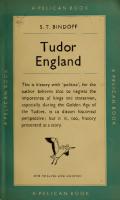Tudor Verse Satire 9781472554451, 9781472510792
This volume brings together examples of English verse satire written during the sixteenth and early seventeenth century,
233 31 12MB
English Pages [184] Year 2013
Recommend Papers

- Author / Uploaded
- K. W. Gransden (editor)
File loading please wait...
Citation preview
PREFACE The present volume is intended to fill a gap in the library of the student (and general reader) of Tudor poetry, by bringing together examples of the verse-satire produced during a period of roughly a hundred years, from about 1510 to 1616 (Skelton to Jonson). Some of the poets included are, of course, available in good modern editions: readers of Spenser and Donne, however, tend to spend little time on the satires (and if a satire of Donne is anthologized it is usually the third); Marston is often anthologized in extracts; while Lodge, Gascoigne, Guilpin and Rowlands remain relatively inaccessible. A number of pieces are reprinted for the first time since the nineteenth century. So far as I know, no modern text of Cock Lorell's Boat or Drant's Horace has hitherto appeared. Moreover, Tudor verse-satire is very inbred. Poets tend to imitate each other, and need to be related to their contemporaries as well as to their common models. I have tried to bring out some of these connections and also, perhaps, to place some of the more familiar pieces in a context from which they are sometimes disadvantageously divorced. I have not attempted in the Notes to reproduce the fullness possible to the editor ofa single author. But I have tried to explain difficult references and archaisms (though the Q.E.D. remains an essential reference book) and to note sources and related passages. Wherever possible, poems are given complete; where it was a case of extracts or nothing (e.g. Spenser) these have been made as self-contained and substantial as possible. The amount of space devoted to each poet does not necessarily imply a value-judgment. Thus I do not think Lodge a better poet than Donne, but in the present context his importance seemed worth demonstrating. The Introduction attempts a general survey of the genre. Further details of individual authors and poems are given in the Notes. My debt to previous scholars and editors will be obvious. I should also like to thank the General Editor of this series, Professor Geoffrey Bullough, for his help in compiling and arranging this volume. I am indebted also to the following, who have helped v
INTRODUCTION Satire has a long and complicated history. Satirical writing of various kinds has flourished in Europe from the time of the Greeks until the present day. In its widest sense, satire reflects the vices, absurdities and miseries of the human condition, together with the satirist's response to them. This response involves some kind ofjudgment, not necessarily explicit, effected by the controlled use of irony, ridicule or criticism. 1 Some of the best satirical writing is to be found in works not formally classified as satires, like the Canterbury Tales. Indeed, satire has often been parasitical upon other forms, so that we may speak of satirical plays or novels as well as satirical poems like those in the present volume or the satires of Dryden and Pope. In defining satire, motive, tone and attitude are better guides than structure. Orwell's Animal Farm may be described either as a satirical allegory or as an allegorical satire. It uses one of the oldest ofliterary devices, the beast-fable, also used by Spenser in Mother Hubberd's Tale (9).2 Satire often uses the techniques of parody and burlesque, which depend on contrasts between matter and manner. Serious matters may be treated comically, as in the plays of Aristophanes, or comic matters mock-seriously, as in Pope's Rape qf the Lock. Ben Jonson's poem The Famous Voyage (37) satirizes both heroic epic and contemporary London by describing a voyage along the Fleet Ditch in terms of Aeneas's journey to the underworld. One of Horace's satires (II, v; cf. 4) is a mock-epic dialogue between Ulysses and Teiresias on how to get rich, satirizing the contemporary vice of legacy-hunting by saying that the epic hero will have to endure far more 'serious' hardships in the pursuit of wealth than he ever did in his Homeric adventures. Another of Horace's satires (1, v) is a description of a journey to Brindisi, making fun of various nuisances encountered on the way. To see this poem as a satire one must clearly work with the broadest possible definition. (A modern parallel might be the letters of E. M. 1
The most recent general survey of the whole field of satire is M. Hodgart,
Satire (1969). 2
These numbers refer to poems included in the present volume.


![Alexander Pope and the Traditions of Formal Verse Satire [Course Book ed.]
9781400857371](https://ebin.pub/img/200x200/alexander-pope-and-the-traditions-of-formal-verse-satire-course-booknbsped-9781400857371.jpg)






